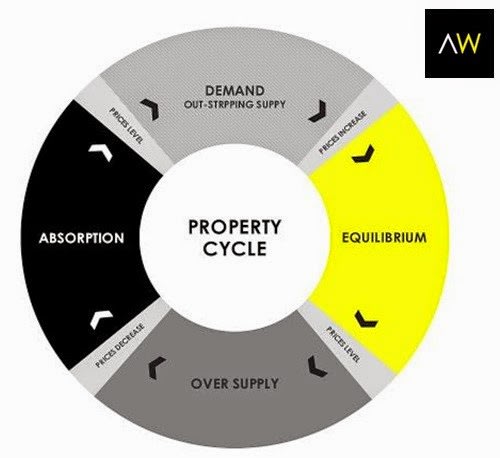Rental market cyclically sluggish: Pete Wargent
The ABS Consumer Price Index figures confirmed that rental growth nationally has continued to be slow - and slowing - of late, as should generally be expected at this stage in the construction cycle.
It's important to recognise, though, that the property market is cyclical. Always has been the case, and always must be!

With annual rental growth declining to +0.7 percent nationally, this was the slowest result in nominal terms since 1994.
One of the outcomes we can expect to see in an era of low inflation and low interest rates is that things will actually decrease in value from time to time!
Something that was of course far less likely in say the early 1980s when inflation was blazing along at 10 to 12 percent and interest rates were much, much higher (the typical home loan rate back then was an eye-watering 12 to 14 percent - yowsers).

The plus side for property investors in this era of lower inflation is that mortgage debt has never been so cheap, with ING releasing a record low variable rate product at just 3.79 percent last week.
City by city
The soft annual result was driven largely by sharp declines in the resources capitals. In Perth, annual rental growth declined by -5.2 percent over the year to June.

And in Darwin, annual rental growth declined to -6.4 percent. Of the smaller capital cities, Hobart and Canberra have both been somewhat soft rental markets in recent years, but both seem to have turned a bit of a corner, with rental growth in Hobart now picking up in response to tight vacancy rates.

Reality check
Slow rental growth seems to cause a good deal of excitement and sometimes hyperbole in reporting, but it is worth stressing that cyclical rental markets are an integral part of the property market and construction cycles.
Moreover, although there are many ways to present data to show it in its most unfavourable light (such as cherry picking start dates, dodgy y-axis selection, adjustments for "inflation", or simply focusing on decreasing annual growth rates) over the long term generally rents do increase in areas where there is the strongest demand for housing.
In fact, despite what you'd think from most articles on the subject, rents are actually at all-time highs in Sydney, Melbourne, Brisbane, Adelaide, and Hobart (even if you must adjust for inflation in the case of the two largest cities).
Historically nominal rents have rarely declined since inflation was was generally stronger, but this may change in future cycles.
Plotted below are the rental CPI numbers indexed back to 1972.
Plotted below are the rental CPI numbers indexed back to 1972.

Naturally enough city-wide figures mask diverging underlying trends. After taking a bit of a look around Sydney last week - see here - I'm fairly sure that off-the-plan unit rents are struggling in the Parramatta LGA, for example.
On the other hand, if you excitedly confronted renters in Manly with a 'good news story' about weak rents you'd likely be met with a hollow laugh.
Another point worth acknowledging is that due to the compounding effect, small increases in rent in the short term tend to stack up to become very large increases over time.

While I've personally been a fan of the idea of "rent-vesting" - renting and investing in multiple properties - I've also often furrowed a brow when media articles suggest that young folk should just forget buying a home and rent instead.
This might have worked if reporters were good at timing market cycles and people were good at saving, but generally speaking they haven't been, and they aren't.
This might have worked if reporters were good at timing market cycles and people were good at saving, but generally speaking they haven't been, and they aren't.
Ultimately home ownership is an effective means of forced saving, and should form an important part of a retirement plan.
The wrap
Broadly as expected, rental growth remains sluggish.
Looking at the pipeline of properties under construction this seems dynamic appears likely to continue for the next couple of years at the capital city level.
Looking at the pipeline of properties under construction this seems dynamic appears likely to continue for the next couple of years at the capital city level.
PETE WARGENT is the co-founder of AllenWargent property buyers (London, Sydney) and a best-selling author and blogger.
His latest book is Four Green Houses and a Red Hotel.
Pete Wargent
Pete Wargent is the co-founder of BuyersBuyers.com.au, offering affordable homebuying assistance to all Australians, and a best-selling author and blogger.
